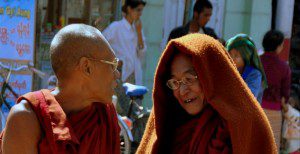
The Irrawaddy Newspaper reports today that fighting has resumed in northern Shan State between government troops and ethnic militias. This fighting, and outbreaks of similar violence throughout the country should underscore the fractious nature of Burma today and the fragility of its movement toward democracy. The Shan are devout Buddhists* and currently spread mostly through northern Thailand and in the Shan State of Burma. The Bamar, the numerically largest ethnic group in Burma, are also devout Buddhists. Their fighting has nothing to do with religion and everything to do with politics, land rights, self-determination, and associated issues. In the north of Burma is Kachin State, home to yet another ethnic group, the Kachin. They are predominantly Christian with a sizable Buddhist minority. They too have been fighting with the central government for decades. And don’t forget the Karen, also mostly Buddhist but with around 15% Christians and a small number of adherents to indigenous religions; they also have an army which is at war with the the central government. In fact, Burma is home to the longest running civil war in history.
None of this is meant to deflect from the recent violence against Rohingya Muslims there, but merely to break down some of the modern myth that Burma is a peaceful Buddhist nation of monks and temples that has only recently and surprisingly seen inter-ethnic (and inter-religious) violence. While certain factions among the Rohingya have also formed militias to fight for independence from the central government, it is fair to say that the reaction against the Rohingya people, both in the past and in the last year or so, has been far more severe than what other groups have faced.
The country, like most of those in the Middle East, is the result of (mostly) British colonialism and ad hoc carving up of nations as the sun began to set on the mighty British Empire. Books have been written on the the clever intrigue, the divide-and-conquer strategies, and the backroom deals that left nations as hodgepodges of ethnic and religious groups unified only by some very vague sense of nationality and the strong hand of a military backed dictator. Having just watched an excellent BBC documentary on Syria, I get the distinct impression that the war there is not a war about religion in the slightest, even though pundits quickly point out that Assad is an Alawite Muslim and the majority of opposition fighters -and the country itself- are Sunni. Instead the war is about failed colonialism and ongoing geo-political interests.
Burma, too, is the result of abandoned colonial exploits and it too has been held together only under the fist of military dictatorship. As that fist lifts I fear we will see more inter-ethnic and religious violence. But before we focus too much on the religious views of those perpetrating the violence, lets remember our history lessons and keep in mind that while religion may be a tool used or an excuse for the next rounds of violence, there are always deeper issues at play.
* I believe 90+% would be a fair estimate of the number of Shan people who are Buddhist, with perhaps up to 5% being Christian due to efforts of missionaries in the 19th-20th centuries and perhaps a very small percentage maintaining pre-Buddhist indigenous religions.












